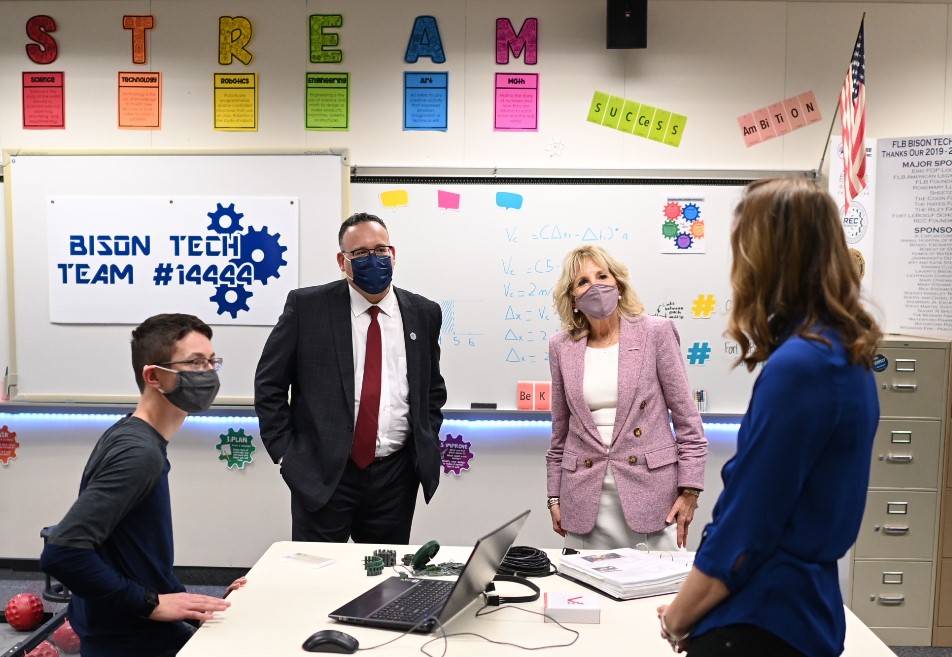National Safe School Reopening Summit: What to Expect
The National Safe School Reopening Summit will bring together educators and stakeholders on March 24 to address concerns and look ahead

Soon after being confirmed as the 12th Secretary of Education, Miguel Cardona wrote an open letter to parents and students to outline his five-point plan to get students back in classrooms and on track.
One of the first steps of that effort will be the virtual National Safe School Reopening Summit on March 24, 2021. The Department of Education will host all the critical stakeholders involved, including students, families, and educators as well as experts from the CDC and the Department of Education. The event will include taped remarks from President Joe Biden and Vice President Kamala Harris, as well as First Lady (and classroom educator) Dr. Jill Biden, Cardona, and the CDC Director Dr. Rochelle Walensky.
The event will feature three main sessions:
- Lessons from the Field: Implementing CDC's K-12 Operational Strategy to Keep Students, Educators, and Staff Safe
- Technical Assistance from CDC and ED: Implementing CDC's Guidance to Keep Students, Educators, and Staff Safe
- Supporting All Students: Addressing the Academic, Social, and Emotional Needs of Students with a Focus on Equity
The goal of this event is to get feedback in order to plan ahead as we transition back to in-person learning and address all the challenges involved.
Tech & Learning recently reached out to nearly 100 educators across the nation to see what issues they’d like to see addressed during this event.
For most, the primary concern of educators is dealing with Covid-19 itself, including best safe classroom practices, which are the focus of the first two sessions. The DOE is following President Biden’s lead and is encouraging states and districts to support getting all educators and administrative staff vaccinated by the end of March. Now that the American Rescue Plan has been signed into law, additional guidance to safely re-open schools to in-person learning is being provided.
Multiple educators cited a concern for student well-being and mental health as they return to the classroom, which the third session will address. Loss created by the pandemic and issues such as isolation and depression during remote learning will need to be handled. Trauma-informed instruction will be a necessary component of education.
Tech & Learning Newsletter
Tools and ideas to transform education. Sign up below.
In addition to addressing the need for increased SEL support, the Department of Education will need to take a leadership role in helping to redesign educational systems to ensure that there is ongoing emphasis on nurturing the whole child.
Other key areas of interest that educators would like to see addressed, either during this event or subsequent ones:
Digital Equity
During the past year, the pandemic has shone a spotlight on issues regarding digital equity and access. Although millions of students gained access in a remarkably short time frame through herculean efforts, there’s more that needs to be done to make sure every student can stay connected to learning.
Multiple educators in the survey want to know what the Department of Education will do to ensure broadband access for all students, including the possibility of working with other federal agencies such as the FCC to establish a nationwide plan.
In addition to boosting connectivity and expanding bandwidth, improving digital resources and professional development are also prominent concerns for educators to help close the digital divide.
Implementing Lessons Learned
Although the last year has been disruptive and traumatic at times, there have been some silver linings. The use of technology in education has been accelerated, and much of it has created new opportunities for instruction.
For the majority of educators, a return to the past way of teaching is unthinkable. Technology is omnipresent in our lives, and many are eager to incorporate it and the lessons learned during the pandemic into education going forward.
The Department of Education is expected to boost these efforts, from encouraging tech-related PD for educators to providing support for continued remote learning for students and families. Examples of remote learning success stories need to be shared, as will best practices for school leaders and district administrators.
Connecting the remote learning and access pieces, some districts are also looking to establish permanent virtual learning academies, and will be looking for national guidance in regard to those efforts.
The Future of Teaching
Beyond providing in-service teachers with PD and health supports, there are a lot of questions regarding the long-term future of the teaching profession in general.
Many districts were already faced with teacher shortages, and the pandemic has exacerbated that, particularly in rural and economically distressed areas. Districts are eager to find and hire properly trained candidates, and need help to connect, even if it means hiring virtual teachers from other parts of the country.
Encouraging students, particularly those of color, to pursue education as a career is also an important issue that needs to be addressed on a national level. And once those aspiring teachers start down the path from being in the classroom to leading the classroom, providing the necessary supports, such as scholarships and student loan forgiveness programs, will be key.
Assessments
Last year, standardized assessments were largely removed from learning efforts, which was met with widespread approval and relief.
Many educators would prefer a continued move away from any mandated assessments, or a significant reformation of the system. Despite this, the Biden administration recently announced that states must test students this spring, which has drawn criticism from many education stakeholders.
If testing needs to be done, the question then becomes how are exams updated to reflect knowledge and mastery of critical real world skills. Another major concern is how education leaders can remove the implicit bias in standardized assessment for students of color and those from low socioeconomic backgrounds.
Cybersecurity
During the pandemic, cyber attacks on schools increased significantly, particularly ransomware attacks. The return to in-person classes doesn’t seem to have slowed this onslaught, prompting educators to seek stronger cybersecurity support.
In addition to more guidance and PD in regard to cybersecurity training, many districts are hoping the federal government will provide additional funding to help protect students, teachers, staff, and all their associated data.
Ray Bendici is the Managing Editor of Tech & Learning and Tech & Learning University. He is an award-winning journalist/editor, with more than 20 years of experience, including a specific focus on education.
